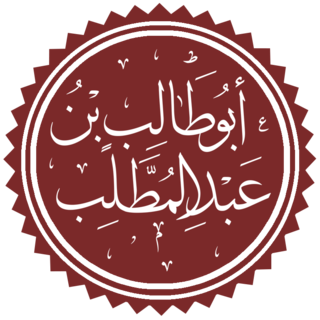
Abdullah ibn Abd al-Muttalib was the father of the Islamic prophet Muhammad. He was the son of Abd Al-Muttalib ibn Hashim and Fatimah bint Amr of the Makhzum clan.

The Battle of the Trench, also known as the Battle of Khandaq and the Battle of the Confederates, was a 27-day-long defense by Muslims of Yathrib from Arab and Jewish tribes. The strength of the confederate armies is estimated at around 10,000 men with six hundred horses and some camels, while the Medinan defenders numbered 3,000.
Ḥārith ibn Abdul-Muṭṭalib was one of the uncles of the Islamic prophet Muhammad. He was the son of Abd al-Muttalib ibn Hashim, of the Quraysh in Mecca, by his first wife, Sumra bint Jundab, who was from Hawazin tribe. For a long time his father, who took from him the kunya Abu al-Harith, had no other children.
The Conquest of Mecca was the capture of the town of Mecca by Muslims led by the Islamic prophet Muhammad in December 629 or January 630 AD (Julian), 10–20 Ramadan, 8 AH. The conquest marked the end of the wars between the followers of Muhammad and the Quraysh tribe.
Muhammad ibn Maslamah was a companion of the Islamic prophet Muhammad. He was known as "The Knight of Allah's Prophet". His kunya was Abu Abdullah or Abu Abd al Rahman. Ibn Maslamah embraced Islam before the Hegira of Prophet Muhammad and his followers. Ibn Maslamah witnessed all the battles except for the expedition of Tabuk, as he was appointed as deputy governor of Medina during the campaign.

Abu Talib ibn Abd al-Muttalib was the second chief of the Banu Hashim clan of the Quraysh. He was the father of the fourth caliph Ali and an uncle of the Islamic prophet Muhammad. Following the death of his father Abd al-Muttalib, Abu Talib inherited the offices of Siqaya and Rifada. He was well-respected in Mecca, despite a declining fortune.
The Expedition of Muhammad ibn Maslamah took place in July, 627 AD in Muharram, 6AH.
Expedition of Fadak, also spelt Fidak, took place in December, 627AD, 6AH, 8th month of the Islamic Calendar
The Surrender of Fadak, also spelt Fidak, or Fidk took place in May 628AD, 2nd month of 7AH of the Islamic calendar.
Raid of Sa'd ibn Zaid al-Ashhali, took place in January 630 AD, 8AH, 9th month, of the Islamic Calendar, in the vicinity of al-Mushallal. Sa'd ibn Zaid al-Ashhali was sent to demolish the images of the gods worshipped by the polytheist tribes around the area.
Expedition of Khalid ibn al-Walid, to Mecca, against Banu Jadhimah, took place in January 630 AD, 8AH, 9th month, of the Islamic Calendar.
The Expedition of Qutbah ibn Amir, against the Khath'am tribe, took place in August 630 AD, 9AH, 2nd month, of the Islamic Calendar.
The Expedition of Alqammah bin Mujazziz, took place in September 630. This expedition was dispatched to fight against some men from the Kingdom of Aksum, who gathered near the shores of Jeddah. The Ethiopians approached Mecca using boats from the sea, leading some Muslims to flee the area, suspecting the Ethiopians of being pirates.
The Expedition of Ali ibn Abi Talib, against the Banu Tai tribe, took place in August 630 AD, 9AH, second month, of the Islamic Calendar. to destroy the statue (idol) of the pagan deity al-Fuls (al-Qullus).
The Expedition of Ukasha bin Al-Mihsan, against the tribes of Udhrah and Baliy, took place in October 630 AD, 9AH of the Islamic Calendar.
Expedition of Khalid ibn al-Walid, to Dumat Al-Jandal, to attack the Christian Prince of Duma, took place in March 631 AD, 9AH, 11th month of the Islamic Calendar, or October 630 AD according to William Montgomery Watt.
Atika bint Abdul Muttalib was an aunt of the Islamic prophet Muhammad.
The Banu Kilab was a Arab tribe in the western Najd where they controlled the horse-breeding pastures of Dariyya from the mid-6th century until at least the mid-9th century. The tribe was divided into ten branches, the most prominent being the Ja'far, Abu Bakr, Amr, Dibab and Abd Allah. The Ja'far led the Kilab and its parent tribe of Banu Amir, and, at times, the larger Hawazin tribal confederation from the time of the Kilab's entry into the historical record, c. 550, until the advent of Islam, c. 630, except for two occasions when the larger Abu Bakr was at the helm. Under the Ja'far's leadership the Kilab defeated rival tribes and the Lakhmid kings and eventually became guards of the Lakhmid caravans to the annual fair in the Hejaz. The killing of a Ja'far chief as he escorted one such caravan led to the Fijar War between the Hawazin and the Quraysh of Mecca.
The Banu Udhrah was a Himyari Jewish tribe during the era of the Islamic Prophet Muhammad which converted to Islam after the Expedition of Ukasha bin Al-Mihsan in 627. During this expedition Muhammad ordered an attack on the Banu Assad bin Qhuzayma to capture spoils. The Battle of Tabouk took place in October 630 to attack the Byzantine empire. Mubarakpuri claims that the reason was revenge for the killing of one of Muhammad's ambassadors by a Christian chief of al-Balaqa, which led to the Battle of Mutah. Mubrakpuri claims this was also the reason for the Battle of Tabouk, and that there was a rumour that Heraclius was preparing an attack on the Muslims. William Muir claims Heraclius wanted to prevent the recurrence of Muslim attacks such as the Expedition of Ukasha bin Al-Mihsan against the Banu Udrah tribe. A tribe that was aligned to the Byzantine Empire


